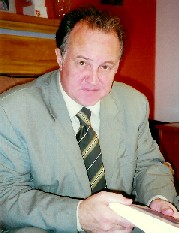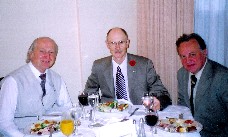Vaschenko – A Literary Bridge-Builder Across Cultural Boundaries Alexandr Vaschenko is visiting Canada in
November 2006
for one month
doing research in Toronto, Ottawa, Vancouver and Castlegar, British
Columbia. In Selkirk College, Castlegar, Alexandr has teamed up with
Myler Wilkinson in preparing comparative literary materials for studies
in Russian and Canadian studies in the respective cultures. Alexandr Vaschenko is visiting Canada in
November 2006
for one month
doing research in Toronto, Ottawa, Vancouver and Castlegar, British
Columbia. In Selkirk College, Castlegar, Alexandr has teamed up with
Myler Wilkinson in preparing comparative literary materials for studies
in Russian and Canadian studies in the respective cultures. For Alexandr ("Sasha") Vaschenko, this work is nothing new. He has been building understanding across cultural divides for the past 30 years. Since his graduation at the Moscow State University (MGU) in linguistics and literatures in the early 1970s, sixty-year-old Alexandr has worked first with the Gorky Institute of World Literature, and now as head of the Comparative World Literature and Culture under the Faculty of Foreign Languages in Area Studies at MGU. As one fully bilingual in Russian and English, Alexandr has lectured and researched in practically every state in the USA a total of 13 times. In Canada he has now been five times. In 1989, for example, Alexandr led a group of four Soviet poets and novelists on a cross-Canada tour, with a major event culminating in Castlegar involving Canadian and Soviet writers. Alexandr served as interpreter. A survey of Doukhobor literary writing was presented by Koozma J. Tarasoff who also assisted as photographer and guide. [See: Writers in Their Society: Soviet and Canadian Writers]
Alexandr has been especially interested in the question of how small and large cultures survive in the face of the assimilative forces of modern technology and economy. Generally assimilation is an attack on ones culture. In order to survive, groups have devised innovative ways to maintain their core values by the technique of accommodation. Some outward forms such as clothing and work methods may change, but the core values persist. Amongst the Doukhobors, for example, the core value of pacifism and the God Within continues firmly established as their basic philosophy of life. Amongst the Natives, the core values of their Spirit Quest persists as well. What is the secret of cultural persistence in world society? That is the big challenge that interests this Russian scholar. Alexandr has come up with the concept of ‘culturology’ to explain how acculturalization occurs as traditional groups preserve aspects of their culture such as language, costumes, and select customs. In his current research in Canada, Alexandr is collecting information on Natives and Doukhobors. He is familiar with both from years of contact with them. In fact, Alexandr is an expert on Pauline Johnson, a Native poet from the Canadian prairies. He has made contact with the Six Nations people in Brantford, Ontario, Dr. Andrew Donskov of the Slavic Research Group in Ottawa, and Simon Fraser University and Selkirk College in BC. Specifically, Alexandr is interested in collecting relevant poetry, prose, folklore, art, and films. When he previewed Andrei Slastukhin’s 2005 film on the Georgia Doukhobors "Lost Land" (Потеряный край)*, he was impressed. This is the sort of resource material that he is looking to enrich his own classes in Moscow. [* I hope we can ditribute this film in North America. I translated the Russian text into English for subtitles, but Slastukhin has not yet replied.] If you have any materials or ideas that you would like to contribute to Alexandr’s fascinating cultural preservation project, contact the Comparative World Literatures and Cultures Faculty at cafedra526@yandex.msu.ru Alexandr Vaschenko
This man with a mission, Alexandr Vaschenko (born in November 1947), is
married. His wife Marina Alexeevna teaches Agricultural Studies at an
Institute in Moscow. His daughter Anna teaches Economics at the Moscow
State University. And his son Vladimir is in his 5th year of studies at
the Comparative World Literatures and Cultures Faculty at MSU. AM Gorky Institute of World Literature 25 A Vorovsky Street Moscow 12106 Russia Also see:
|
Back to Spirit-Wrestlers.com

